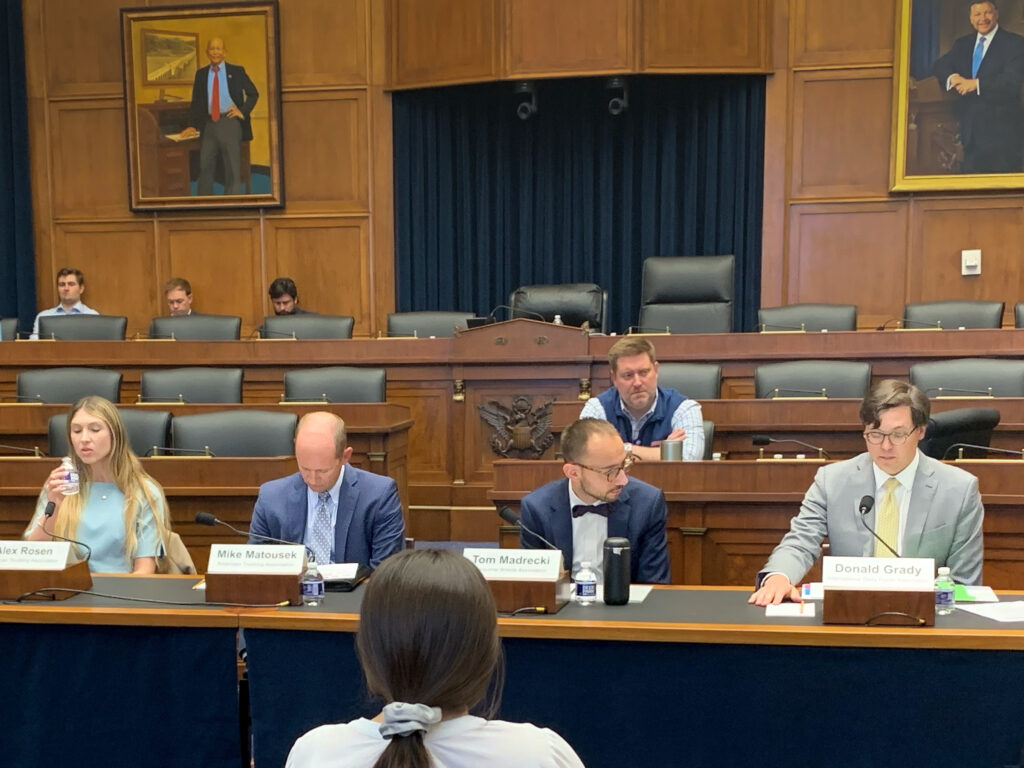By Donald Grady, director, legislative affairs, IDFA
The United States’ road, rail and shipping infrastructure and systems are not modernizing quickly enough to support the U.S. dairy industry’s growth. While IDFA supported the passage of landmark legislation—the Ocean Shipping Reform Act (OSRA)—just last year, a lot of work remains to be done to support the transportation needs of our growing industry. In particular, there are three actions Congress could take immediately to improve our transportation system:
- Ensure the Federal Maritime Commission honors the integrity of OSRA as it promulgates rules
- Build on the success of OSRA by passing the Ocean Shipping Reform Implementation Act (H.R. 1836), also known as OSRA 2.0, and
- Pass the Gross Vehicle Weight Limits State Opt-In Pilot Program (H.R. 3372) and the LICENSE Act (H.R. 3013).
Yesterday, I provided oral testimony at a congressional briefing of the U.S. House Transportation and Infrastructure Committee. During that testimony, I urged the more than 60 committee staff present to support these legislative priorities for our industry. Below is information about each of these legislative priorities, including a new campaign on the IDFA Campaign Center that will allow you to directly advocate for the Gross Vehicle Weight (GVW) pilot program. I encourage you to join IDFA in this advocacy, and I appreciate your support!
FMC's OSRA Rules
Despite not being fully implemented, U.S. dairy exporters are already seeing benefits from the passage of the Ocean Shipping Reform Act. As an industry that exports over $9 billion in dairy products annually – which breaks down to the equivalent of more than one day’s worth of milk a week – we rely heavily on our ability to export.
Prior to OSRA becoming law last year, at the height of the pandemic, U.S. dairy exporters struggled with port congestion and ocean carriers leaving U.S. ports with empty containers, causing milk to back up all the way to the farm.
The existence of the impending OSRA rules means we are now seeing ocean carriers change the way they handle issues specifically targeted by OSRA rules, such as waiving or refunding erroneous detention and demurrage charges without dispute.
In fact, even before that process was implemented, our dairy exporters informed us that hundreds of thousands of dollars in false detention and demurrage charges were automatically reversed by ocean carriers before exporters had to challenge them.
Yet the Federal Maritime Commission remains woefully behind schedule on the statutory timeline for publication and enforcement of these rules, and realistically could use more resources to effectively enforce the new rules. The win of the Ocean Shipping Reform Act will only remain a win if FMC is able to push forward with the rules it is required to implement under the law.
OSRA 2.0
OSRA laid the groundwork for significant improvements to our ocean shipping system, but this is something we must build on. U.S. Reps. Dusty Johnson (R-SD) and John Garamendi (D-CA) in March introduced a new bill in the U.S. House of Representatives named the Ocean Shipping Reform Implementation Act, or OSRA 2.0.
Among the improvements, OSRA 2.0 would establish that both imports and exports are part of the FMC’s mission in enforcing the Shipping Act. This proposed change reflects the sensibility that the use of American ports by carriers is a privilege – not a right – and that practices that effectively discriminate against exports, are potentially actionable under the law.
Further, imagine shipping hundreds of thousands of dollars in product and having little to no visibility on the status or disposition of your cargo? That’s today’s reality, and why IDFA fully supports OSRA 2.0’s data streamlining measures, which would require the FMC to develop a federal supply chain data standard. IDFA stands ready to partner with Congress on these points within OSRA 2.0 and many others to continue the momentum of reforming our nation’s supply chain.
SHIP IT Act
We also stand ready to seek similar reforms for dairy processors who service domestic customers through trucking.
IDFA is a member of the Shippers Coalition, and we strongly support the SHIP IT Act, and in particular we are excited about two provisions we think will make a difference: a pilot program to allow states the option of permitting trucks to operate at up to 91,000 lbs. on an additional sixth axle, and to allow interstate CDL exam administration.
GVW Limit Increase
IDFA has long advocated for an increase in the federal Gross Vehicle Weight limit. Thus, we strongly support a pilot program included in the SHIP IT Act to give states the option to allow trucks up to 91,000 lbs. on an added sixth axle to travel on interstate highways within their borders.
The pilot program to be considered would require a truck trailer to be fitted with an additional sixth axle, which is critical. The additional axle means another set of brakes, it means more tires that can disperse weight more gently over the road and is federal bridge formula compliant. There are multiple studies, including one by the DOT, that shows additional brakes stop the truck more quickly and the added tires mean less road wear because of better weight disbursement.
IDFA believes a commonsense approach like a modest truck weight increase – something that had not been done for 41 years – would lead to fewer trucks on the road consuming diesel and emitting greenhouse gases. In a recent dairy economics study, it was estimated that modernized truck weights could save the cheese, butter and powder sectors more than 105,000 truck trips annually. That is a cost savings of more than $200,000,000. When you also consider milk, ice cream, and cultured dairy product shipments, the dairy industry’s environmental and cost savings would be even higher from this GVW limit increase.
Interstate CDL Administration
IDFA members tell us that they struggle to onboard new drivers because they are unable to find local in-state appointments for the CDL exam. IDFA supports the LICENSE Act of 2023, which would allow interstate CDL exam administration, aspiring drivers are having to travel more than four hours each way to obtain their CDL – an entire work-day or more lost to travel.
Given the ongoing driver shortage, allowing a state to administer the exam to an out-of-state applicant is commonsense, especially when that driver will be participating in interstate commerce and the certification they receive is recognized by every state they drive through.
---
These are just two of the ways IDFA believes SHIP IT may expand the momentum of supply chain reform beyond ocean shipping. Trucking and rail as modes of transportation are equally or more in need of reform in order to maintain our nation’s food and economic security. Now is the time to push for that reform, not waiting until the next national supply chain crisis.
How You Can Help
Join us in keeping the momentum going! Please take just two minutes to send your Members of Congress an email in support of the GVW pilot program. Live on the IDFA Campaign Center is a pre-filled email that you can send to your representatives with one click of a button.
Thank you for your support!
IDFA Staff Contact

Donald Grady
Senior Director, Legislative Affairs

